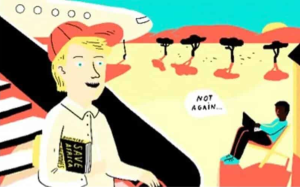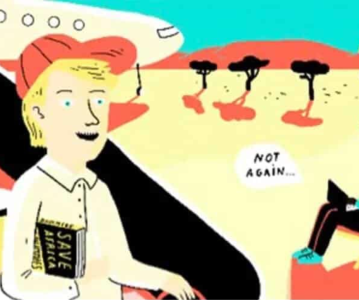
By Gina Geoghegan
Finding any recent academic literature today that does not fundamentally challenge traditional approaches to Communication for Development seems almost impossible. Within a sector desperately needing a makeover, themes such as Localisation and Decolonisation provide a revitalising lift, and at first glance, you could be fooled to think that Development now has all the tools with which to dismantle the Master’s House (Lorde, A.,1984).
However, this is far from the case. Development as a sector still fundamentally relies on Western neoliberal capitalist (colonial) models of progress and paternalistic aid structures, which cannot and have not effectively addressed the complex issues they seek to solve. (McNair, 2024, pp. 11–19). So where is it all going wrong and how can we decolonise Development and become “constructively complicit” (The Development Hub, May 2024). According to Allan Moolman, the head of partnerships for Oxfam UK, it begins with the individual;
“… probably the biggest challenge [for the] development [sector is] our role in maintaining the colony, and so the starting point for me is to build a deep reflective and reflexive practice that constantly asks whether I am creating new forms of distorted hierarchical power or whether my actions are actually leading to an expansion and a sharing and a remodelling of power that allows us to see the world in a different way…” (The Development Hub, 17 Jan 2024).
For Moolman, decoloniality is a way of being. Once properly examined in oneself only then can it “cascade” (The Development Hub, 17 Jan 2024) outwards. So, how can we foster a culture of reflection and reflexivity within the Development sector to challenge ingrained assumptions and create more equitable, practical approaches to global challenges? How can we become “constructively complicit” so that we can “ be attentive to the way that power operates within your community, within your team, and how that… impact[s] the work that you do in the processes and the outcome. And I think when you get to a point when you are critically self-reflective, and you are aware of these different biases, and you are aware of power differentials, that then calls for an opportunity to think, okay, well, where can I cede power?” (The Development Hub, 2024).
For me, it must begin before we enter the workforce; we have to start this practice at university or earlier. To truly unshackle itself from its paternalistic colonial past, Development studies must allow students to look inward and challenge their own internalised racial biases in a safe space.
However, transformation requires time and patience, resources that can be scarce when working as a practitioner (with demands such as deadlines or deliverables) but could be found in bounty at universities and colleges. Institutions would also be able to give adequate supervision and support whilst the students learn these reflective processes or “confessionary practices”, allowing for an enhanced outcome as the learning has taken place in a safe space and within a group, enabling them to (Reid, H.L. 2016).
There are many examples of businesses that promote this kind of facilitated learning for the development sector, for example the newly established Design for Social Impact (DfSI) “offer an applied, online service design education program to empower individuals and organisations from all walks of life. Our courses are tailored to equip learners with the skills, knowledge, and mindset needed to create equity-centred social impact solutions that truly make a difference.” (https://www.designforsocialimpact.io/, 2024). These kinds of courses could be introduced as part of a BA or MA to actively engage students in ongoing and open discussions with peers and teachers. Practising personal reflection whilst studying could be crucial in transforming individual behaviour and tackling the broader systemic inequalities in the development and aid sectors. Understanding that this form of practice cannot be learnt in isolation is also a way of breaking through the neoliberal headlock which encourages individualism over community.
Cultivating these skills should be a core element of any development studies curriculum, equipping future professionals with the tools to foster a more innovative, effective, and just approach to Development. Then maybe we will be able to move beyond the page and build something radical, dignified and sustainable.
This kind of introspection is, according to Mahrukh ‘Maya’ Hasan, (Founder and Director of Azura Labs), essential for meaningful transformation in both personal and organisational contexts ” (ReThinking Development, 2021) because “It’s not a question of are we racist? It is how racist are we?” (ReThinking Development, 2021).
References-
Bendix, D., Müller, F., & Ziai, A. (Eds.). (2020). Beyond the master’s tools? Decolonizing knowledge orders, research methods and teaching. Rowman & Littlefield. Lanham, Boulder, New York, London.
Bhambra, G. K., Gebrial, D., & Nişancıoğlu, K. (Eds.). (2018). Decolonising the university. Pluto Press.
Cornwall, A. (2007). Buzzwords and fuzzwords: Deconstructing development discourse. Development in Practice, 17(4-5), pp. 471–484. Taylor & Francis, Ltd., on behalf of Oxfam GB
Geertz, C. (1973). Toward an interpretive theory of culture. In The interpretation of cultures: Selected essays (pp. 3–30). Basic Books.
Kothari, U., Melber, H., Camfield, L., & Biekart, K. (Eds.) (2023). Challenging Global Development: Towards Decoloniality and Justice. (EADI Global Development Series). Palgrave Macmillan. https://doi.org/10.1007/978-3-031-30308-1
Lorde, A. (1984). The master’s tools will never dismantle the master’s house. In Sister Outsider: Essays and Speeches (pp. 110-113). Crossing Press
McNair. (2024). How circular cooperation puts reciprocity at the heart of a new Africa-Europe relationship. In Why Europe needs Africa (pp. 11–19). Retrieved from https://eurasia.ro/wp-content/uploads/2024/07/McNair-Why-Europe-Needs-Africa-2024.pdf
McCleary-Gaddy, A.T., Smith, C.C. & Davis, J. A Call to Action: Six Anti-Black Racism Topics Practitioners Encourage Researchers to Investigate. J Bus Psychol 38, 135–144 (2023). https://doi.org/10.1007/s10869-022-09839-7
Melber, H., Kothari, U., Camfield, L., & Biekart, K. (Eds.). (2024). Challenging global development: Towards decoloniality and justice. Palgrave Macmillan.
Reid, H.L. (2016) Introduction to Career Counselling & Coaching. London: Sage, pp.241-259.
Rethinking Development Podcast, September (2021). Noaman and Safa: Decolonialism is not a metaphor, [Audio podcast episode]. In Rethinking Development. Rethinking Development Podcast. https://www.rethinkingdevelopmentpodcast.com/listen/episode-5-1-decolonization-is-not-a-metaphor
Rethinking Development Podcast. (2021). Mahrukh: On confronting biases and decolonizing aid [Audio podcast episode]. In Rethinking Development. Rethinking Development Podcast. https://www.rethinkingdevelopment.org/podcast
Schwittay, A. (2024). University work experiences in international development: Expanding locations, spaces and pathways. Progress in Development Studies, 24(3), 252-267, SAGE Publications
The Development Hub. (January 17, 2024). Allan Moolman: Decoloniality as a way of being, and why language matters [Video]. YouTube.The Development Hub Podcast. https://www.youtube.com/watch?v=Nkwipyrvo_w
The Development Hub. (May 22, 2024). Jess Oddy: Co-design, care and solidarity in social impact research projects [Video]. YouTube.The Development Hub Podcast. https://www.youtube.com/watch?v=62kH1QlWFV0
The Development Hub. (September, 2023). Jonathan Glennie: Circular cooperation, dignity, and listening: Reframing international aid [Audio podcast episode]. In The Development Hub. Buzzsprout. https://www.buzzsprout.com/2127169/episodes/14990822-circular-cooperation-dignity-and-listening-reframing-international-aid-jonathan-glennie-interviewed
Tuck, E., & Yang, K. W. (2012). Decolonization is not a metaphor. Decolonization: Indigeneity, Education & Society, 1(1), 1–40.
Image from: https://charlies-travels.com/en/escape-from-white-savior-syndrome/


This is a really important subject, thank you for writing about this, Gina. I agree that there needs to be a level of introspection especially for ComDev students, and incorporating such skills in university curriculum is an excellent way of achieving this. This, in my opinion, will foster the quest for decolonisation and enable future practitioners contribute meaningfully and objectively to global conversation.
– Anita
Thank you for this really interesting piece, Gina! I loved how you stressed the importance of reflexivity and breaking down power structures in Development. The idea of starting this process early, even at university, really stuck with me—it sounds like such an important step toward actual change.
But I wonder, how do we make sure all this reflection doesn’t just stay as theory in classrooms or training but actually leads to real shifts in how organizations work? Do you think people in the Development sector are ready for this level of self-examination, or is it more likely to hit resistance?
Thanks for sharing these ideas—it’s definitely got me thinking in new ways!